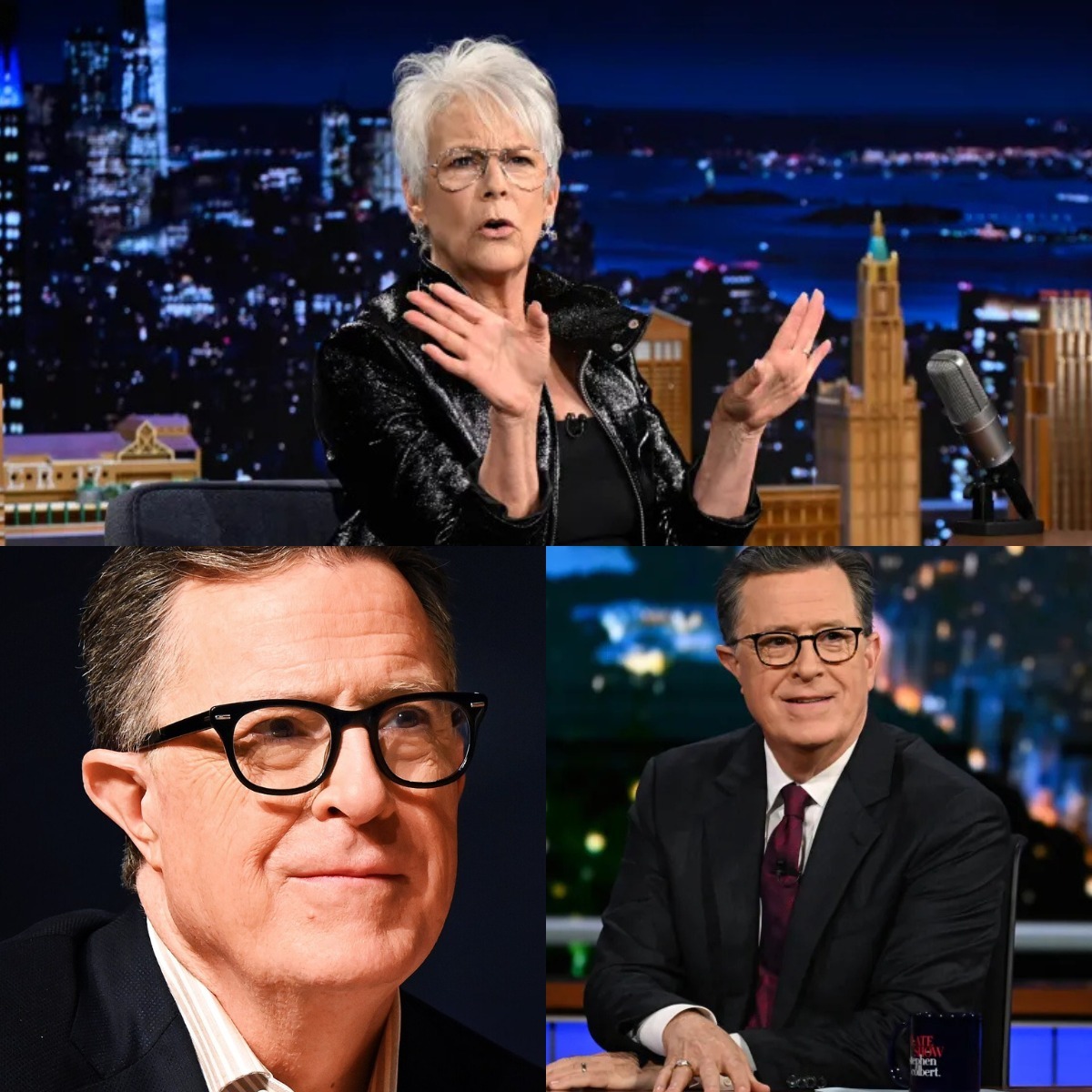In a revelation that has taken the television industry by surprise, actress Jamie Lee Curtis has publicly accused CBS of “gagging” her in the wake of Stephen Colbert’s sudden departure from The Late Show. Her sharp words have set off heated discussions about free expression, corporate control, and the uncertain future of late-night programming.

The Stunning Accusation
Jamie Lee Curtis, beloved for her decades of iconic roles in Hollywood and known as an outspoken advocate for artistic freedom, didn’t hold back during a recent interview. She claimed that CBS deliberately tried to suppress her voice after Colbert’s abrupt exit.
“I was basically gagged by CBS,” Curtis declared. “After Colbert left, the atmosphere changed. Voices like mine were stifled. It felt like the network wanted total control over the narrative — no questions asked.”
Her blunt remarks painted a picture of a network under strain, seemingly focused on damage control rather than open conversation, leaving many to wonder just how much creative talent is allowed to speak freely once corporate interests come into play.
The Colbert Departure That Rocked CBS
The shock began with Stephen Colbert himself. His departure from CBS was both unexpected and disruptive, leaving one of the most influential chairs in late-night television empty. Colbert, who succeeded David Letterman, had built a loyal following and given CBS credibility in the competitive late-night space.
The sudden cancellation of The Late Show with Stephen Colbert was not only a business move but also a cultural blow. Fans and media insiders immediately speculated about behind-the-scenes tension, financial disagreements, and shifting network strategies. For a network already struggling to keep pace with streaming giants and younger audiences, the loss of Colbert was a massive setback.
What Jamie Lee Curtis Claims Happened
While Curtis has not laid out every detail, industry sources suggest that she was vocal about supporting Colbert and criticizing CBS’s handling of his exit. According to insiders, the network may have pressured talent and collaborators to remain silent, aiming to tightly manage the narrative and prevent further controversy.
For someone as seasoned and respected as Curtis, the alleged attempt to muzzle her only highlighted deeper issues within network culture. To her, it was not just about Colbert leaving — it was about silencing anyone who dared to question the network’s decisions.
Industry Reactions: Whistleblower or Out of Line?
Curtis’s comments have split the industry down the middle. Some insiders applaud her bravery, framing her as a whistleblower exposing the reality of corporate censorship in entertainment. In their view, networks like CBS prioritize ratings and advertising dollars over transparency, and Curtis’s claims shine a light on an uncomfortable truth.
Others, however, see the dispute as part of the typical high-stakes politics of television. They argue that networks often try to maintain control during times of transition and that clashes with outspoken talent are inevitable. To these critics, Curtis may be overreacting or exaggerating the extent of CBS’s actions.
Still, the fact that her words have drawn such intense public attention underscores how deeply late-night television remains tied to America’s cultural pulse.
Late-Night TV at a Crossroads
Curtis’s allegations come at a time when late-night television is already under pressure. Viewership has steadily declined as younger audiences turn to streaming services, podcasts, and social media for entertainment and commentary. Once seen as the pinnacle of cultural influence, late-night shows now fight for relevance in a crowded digital world.
The loss of a major figure like Colbert only complicates matters for CBS. With Curtis’s accusations now circulating, the conversation has shifted beyond just finding a replacement host. Instead, fans and critics are questioning whether networks like CBS can maintain credibility if they are perceived as silencing creative voices behind the scenes.
This controversy also raises broader questions: Can late-night TV survive as an authentic platform for cultural dialogue if corporate interests dominate? Or is the format destined to lose its impact to unfiltered platforms where creators face fewer restrictions?
CBS’s Silence and What Comes Next
So far, CBS has not issued a formal response to Curtis’s claims. The network’s silence has only fueled speculation, with many wondering whether executives are strategizing behind closed doors or hoping the storm will simply pass.
Meanwhile, late-night fans are watching closely. Some are calling on CBS to address the accusations directly, while others believe the network should quickly move on to rebuilding its late-night programming. As for Curtis, her outspoken stance has positioned her as a central figure in this unfolding drama, one who may continue to push back against the corporate culture of silence she has accused CBS of enforcing.
Regardless of how CBS chooses to respond, this situation has already shaken the late-night television landscape. What might have been just another host transition has now become a larger debate about freedom, censorship, and the integrity of the networks that dominate American television.
Conclusion
Jamie Lee Curtis’s decision to speak out against CBS has turned what was already a turbulent moment for the network into a full-blown industry controversy. Her accusation that she was silenced after Colbert’s exit touches on issues far bigger than one show or one network — it speaks to the balance of power between creative talent and corporate media giants.
Whether Curtis’s words will lead to lasting change or simply fade into the whirlwind of Hollywood drama remains to be seen. But for now, one thing is certain: her bold claims have made sure the future of late-night TV won’t be discussed without mentioning the tensions she has brought into the spotlight.





